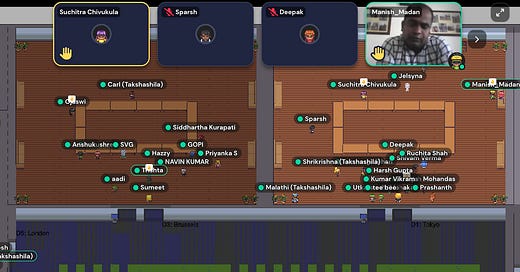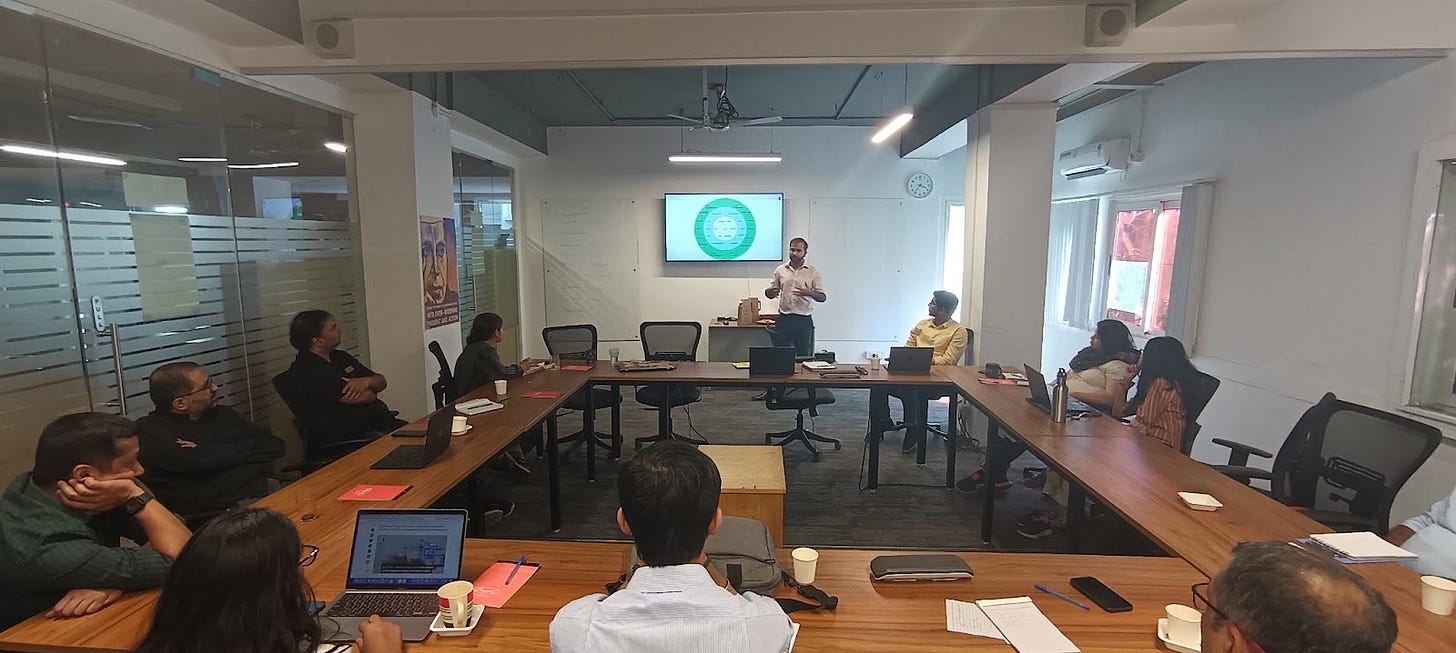Takshashila Announces New Pakistan Research Fellowship
Dear Reader,
Hope you are doing well. In this edition, you will find updates on the Network for Advanced Study of Pakistan (NASP) Fellowship, Takshashila Academic Conference 2023, our position paper on China’s economy, Indo-U.S. space cooperation, analysis of the 2023 defence budget, the GST appellate tribunal and more.
Also, the applications for our unique and specialised 3-week course on Space Power are closing tomorrow - so apply now!
Takshashila Announces New Pakistan Research Fellowship
The Takshashila Institution has established a new Network for Advanced Study of Pakistan (NASP) Fellowship. This is a unique programme that aims to create high quality scholarship and knowledge of Pakistan by nurturing new generations of analysts in academia, think tanks, media and industry.
NASP is currently inviting applications from researchers from any background, including from universities, research institutes, media, government services and industry, who are enthusiastic about undertaking fresh research on Pakistan.
The NASP Fellowship offers opportunities for fellows to work under the co-guidance of foremost experts and work towards a publication in the leading journals and publications in the field.
A cash prize of ₹1 lakh will be awarded to each of the five best papers determined by the jury.
To know more about the NASP Fellowship:
To express your interest in applying to the NASP Fellowship:
Takshashila Academic Conference - February 2023
The Takshashila Institution conducted a two-day online Academic Conference for its 34th cohort of the Graduate Certificate in Public Policy (GCPP) course on the 18th and 19th of February 2023. The Academic Conference had different keynote, breakout and spontaneous order sessions.
A part of the conference was held on Takshashila’s Virtual Campus, hosted on the futuristic proximity A/V platform: Gather Town.
Several prominent thinkers, scholars and experts participated in the conference to give our students an overview of various public policy domains ranging from conflict analysis, algorithmic audits, great power competition, behavioural economics, outer space as a strategic environment and law-making in India!
This Twitter thread captures the happenings at the conference:


Find out more about GCPP and the exciting opportunities it provides:
Chinese Economy: A Bird’s View
Takshashila’s latest Position Paper ‘Chinese Economy: A Bird’s View’ by Anushka Saxena and Amit Kumar looks at the economic impact of China's Zero-COVID restrictions, the discourse over decoupling of supply chains, and structural fiscal and monetary challenges that China faces in the near term.
Takshashila Position Papers provide iterative analyses of a particular topic, through constant monitoring and periodic updating of our assessments. We also invite readers to discuss and deliberate on developments related to a particular topic, contributing to this process of iterative analysis. Write to us at research@takshashila.org.in.
Indo-U.S. Space Cooperation
In an opinion for The Hindu, Pranav R. Satyanath writes that overcoming structural barriers can lead to a deeper and long-term partnership between India & the U.S. in the new space age:
In November 2022, the U.S. kicked off its Artemis programme by launching the Orion spacecraft towards the moon and bringing it safely back to earth. India itself is set to embark on its first human spaceflight mission (Gaganyaan) in 2024. The two countries have also taken significant strides in advancing the private space sector. Together, these endeavours will shape and impact U.S. and Indian space policies and programmes over the next decade. In this context, a U.S.-India collaboration seems straightforward. India could secure technologies and expertise by collaborating with an advanced spacefaring nation; the U.S. could strengthen its relationship with India on a matter that seems less controversial than others.
Defence Budget Analysis - 2023
Can India handle the threat from China without substantially increasing its defence expenditure?
In his annual analysis of the defence budget, Pranay Kotasthane, in a column for the Hindustan Times, answers the question and more:
Another defence budget zoomed past us this month. Since then, analyses have focused on how defence spending for the coming year departs from the previous one. Some have waved a red flag as defence spending has fallen below 2% of the Gross Domestic Product (GDP) for the first time in many years. On the other hand, the defence ministry’s post-budget statement emphasised a 44% increase in operational spending, which it said will close critical gaps in combat capabilities and equip the forces in terms of ammunition, sustenance of weapons and assets, and military reserves. The ministry also highlighted that the capital outlay for modernisation and infrastructure development rose by a handsome 57% over the last five years.
The GST Appellate Tribunal Opportunity
Despite nearly 6 years of implementation of GST in India, the GST Appellate Tribunal (GSTAT) is yet to be constituted. However, GSTAT presents a once-in-a-lifetime opportunity to create a resilient and state-of-the-art dispute resolution mechanism in the country.
In an episode of All Things Policy, Sarthak Pradhan & Shrikrishna Upadhaya speak to Jatin Christopher (Partner, JCSS, Bengaluru) & Surya Prakash B.S. (Programme Director, DAKSH, Bengaluru) on the work of the Coalition of GSTAT in advocating for institutional design, operating model, and legal framework for a truly modern GSTAT.
Inaugural Conference of the Biology and Policy Society
Takshashila Institution’s Biology and Policy Society held its inaugural conference on Friday, February 17th, 2023. The theme for the conference was ‘A New Way to Analyse Climate Change using Biological Reasoning’.
Dr. Shambhavi Naik and Dr. Harshit Kukreja presented several biological reasoning frameworks that can assist in fast-tracking climate action. The participants discussed human behavioural tendencies which impede urgent climate action.
How do we ensure individuals undertake costly behaviour in the short run to form the basis of collective action against climate change in the long run?
If you are interested to know more about the biological reasoning approach to public policy, do visit this page and sign up.
Also, subscribe to the fortnightly newsletter Insights from Biology:
Space Power Course: Applications Close Tomorrow
The ability to use space for commercial, scientific, and military purposes is a vital determinant of national power. Recent years have seen the rise of a global commercial space sector, growing lunar ambitions, and plans for interplanetary exploration.
The Special Credit Course on Space Power will provide an introduction to emerging issues related to space and how those could shape India’s interests, its opportunities, and the choices it makes. The course will cover the government and commercial space sectors, strategic affairs, and international governance.
The course is primarily designed to be useful for government officials, armed forces members, space entrepreneurs, lawyers, academics, policy professionals, and other individuals interested in outer space affairs. It will be conducted online only on weekends.
That’s all from us this week. Take care!








